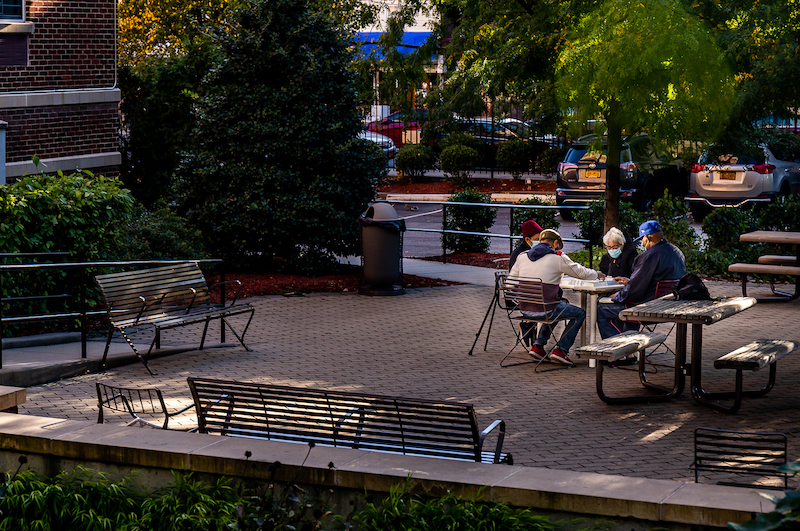“An estimated 158,214 households are eligible for SCRIE or DRIE—but only 67,132 are currently enrolled. That means nearly 57.6 percent of tenants who could be protected may still face avoidable rent hikes in the months ahead.”
An early evening games of dominoes at Serviam Gardens, an affordable housing complex for seniors in the Bedford Park neighborhood of the Bronx. (Adi Talwar)
For decades, Vincient Grillo, a 61-year-old lifelong New Yorker in Upper Manhattan, lived quietly in his family’s rent-controlled apartment. Like many older New Yorkers on fixed incomes, he worried about what would happen when his lease expired and his rent increased.
“I was ready to pack my bags and leave,” he said.
Thanks to the city’s Rent Freeze Program—which includes the Senior Citizen Rent Increase Exemption (SCRIE) and the Disability Rent Increase Exemption (DRIE)—Vincient’s story took a different turn. Connected through the Tenant Helpline to Outreach Specialist Michael Luat, he applied for the benefit with hands-on support.
“I had given up. But Michael kept texting, even when I wasn’t responding. He never gave up on me,” Vincient recalled. Through the Rent Freeze Program, his rent was reduced $900 to $563, allowing him to remain in the apartment his family has called home since 1959.
“This apartment is more than just four walls—it’s the only home I’ve ever known. It’s my safety net,” he said. “Without Rent Freeze, I wouldn’t have made it.”
The Rent Guidelines Board recently approved new increases for tenants in rent-stabilized apartments. The most recent order applies to leases commencing on or after Oct. 1, 2025, through Sept. 30, 2026. If your lease renews during this time, a one-year lease may rise by 3 percent, while a two-year lease could increase by up to 4.5 percent. For many older adults and people with disabilities, those hikes come on top of already rising costs for groceries, medications, and utilities.
But these increases are not inevitable. Through SCRIE and DRIE, tenants who qualify can lock in their rent at its current amount. Landlords receive a tax credit to cover the difference, while tenants gain long-term stability and peace of mind. Once enrolled, the benefit carries forward year after year through renewals.
The challenge is that far too many eligible New Yorkers never apply. According to the most recent data, an estimated 158,214 households are eligible for SCRIE or DRIE—but only 67,132 are currently enrolled. That means nearly 57.6 percent of tenants who could be protected may still face avoidable rent hikes in the months ahead.
At the Office of the Taxpayer Advocate, Robin Lee sees first-hand the frustration of tenants who have tried and failed to navigate complex systems. “When people tell us they’ve given up,” she said, “it’s our responsibility to make sure the system itself isn’t what’s standing in their way.”
Navigating government paperwork is difficult even in the best of times. That’s why the NYC Mayor’s Public Engagement Unit (PEU), the NYC Office of the Taxpayer Advocate (OTA), and the NYC Department of Finance (DOF) are working together to ensure tenants like Vincent don’t fall through the cracks.
As Jasmin Batista, who leads tenant outreach at the Public Engagement Unit, explains, her team’s approach starts on the ground: meeting people where they are—at their doors, on their phones, and in their neighborhoods. “No one should lose their home over bureaucracy,” she said. “Programs like Rent Freeze only work when people can actually access them.”
Together, PEU, OTA, and DOF have helped thousands of New Yorkers apply or renew their Rent Freeze benefits. But thousands more remain eligible and unenrolled. If you are age 62 or older or living with a qualifying disability, rent a rent-stabilized apartment, and meet the income requirements, you may be eligible to freeze your rent before the rent increases take effect.
At the Department of Finance, Commissioner Preston Niblack describes Rent Freeze as one of the city’s most effective tools for keeping people housed. Through partnerships with PEU and OTA, he said, “we’re cutting through red tape and reaching tenants who might otherwise never hear about these protections.”
Help is available right now. You can call the PEU Rent Freeze Hotline at 929-252-7242, visit nyc.gov/rentfreeze, or get in-person assistance at a NYC Department of Finance office. Don’t wait. Freezing your rent today could save you thousands of dollars over the years ahead. More importantly, it could be the key to staying in the home you love.
Programs like Rent Freeze don’t just shield people from rising costs—they protect dignity, independence, and the ability to age in place. At a time when affordability feels increasingly out of reach, that kind of stability has never been more important.
Jasmin Batista is the outreach director for the Tenant Support Unit at the NYC Mayor’s Public Engagement Unit. Robin Lee is the taxpayer advocate at the NYC Office of the Taxpayer Advocate.
The post Opinion: As Rents Rise Again, Too Many Seniors Don’t Know They Can Freeze Theirs appeared first on City Limits.


Leave a Reply